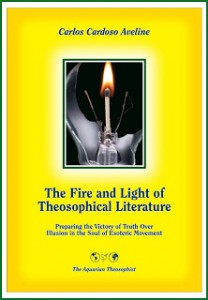
A Discourse to One’s Own Immortal Self
Kahlil Gibran

An expanded contact with our immortal soul must take
place on universal levels of consciousness and compassion
place on universal levels of consciousness and compassion
A 2014 Editorial Note:
The following poem illustrates the work of Antahkarana – the bridge between lower self and immortal soul -, when it is seen from the point of view of one’s terrestrial efforts to attain wisdom.
The verses strongly resonate with the original teachings of esoteric philosophy. As examples of the theosophical identity and meaning of the poem, it is enough to mention here a few sentences from the classical work “The Voice of the Silence”, translated and annotated by H.P. Blavatsky (Theosophy Co. edition). That masterpiece of theosophical literature belongs to Eastern esoteric schools.
Among many similar passages, “The Voice of the Silence” says:
1) “The Self of Matter and the SELF of Spirit can never meet. One of the twain must disappear; there is no place for both.” (Fragment I, p. 13)
2) “The ladder by which the candidate [to wisdom] ascends is formed of rungs of suffering and pain; these can be silenced only by the voice of virtue.” (Fragment I, p. 16)
3) “If thou would’st reap sweet peace and rest, Disciple, sow with the seeds of merit the fields of future harvests. Accept the woes of birth.” (Fragment II, p. 34)
Indeed, an expanded contact with our immortal soul must take place on universal levels of consciousness and compassion.
The poem “Have Mercy on Me, My Soul!” is reproduced from pp. 17-19 of the book “Tears and Laughter”, by Kahlil Gibran, The Wisdom Library / The Philosophical Library, New York, 1949, 94 pages.
(Carlos Cardoso Aveline)
000
Have Mercy on Me, My Soul!
Kahlil Gibran
Why are you weeping, my Soul?
Knowest thou my weakness?
Thy tears strike sharp and injure,
For I know not my wrong.
Until when shalt thou cry?
I have naught but human words,
To interpret your dreams,
Your desires, and your instructions.
Look upon me, my Soul; I have
Consumed my full life heeding
Your teachings. Think of how
I suffer! I have exhausted my
Life following you.
My heart was glorying upon the
Throne, but it is now yoked in slavery;
My patience was a companion, but
Now contends against me;
My youth was my hope, but
Now reprimands my neglect.
Why, my Soul, are you all-demanding?
I have denied myself pleasure
And deserted the joy of life
Following the course which you
Impelled me to pursue.
Be just to me, or call Death
To unshackle me,
For justice is your glory.
Have mercy on me, my Soul.
You have laden me with Love until
I cannot carry my burden. You and
Love are inseparable might; Substance
And I are inseparable weakness.
Will ever the struggle cease
Between the strong and the weak?
Have mercy on me, my Soul.
You have shown me Fortune beyond
My grasp. You and Fortune abide on
The mountain top; Misery and I are
Abandoned together in the pit of
The valley. Will ever the mountain
And the valley unite?
Have mercy on me, my Soul.
You have shown me Beauty, but then
Concealed her. You and Beauty live
In the light; Ignorance and I are
Bound together in the dark. Will
Ever the light invade darkness?
Your delight comes with the Ending,
And you revel now in anticipation;
But this body suffers with life
While in life.
This, my Soul, is perplexing.
You are hastening toward Eternity,
But this body goes slowly toward
Perishment. You do not wait for him,
And he cannot go quickly.
This, my Soul, is sadness.
You ascend high, through heaven’s
Attraction, but this body falls by
Earth’s gravity. You do not console
Him, and he does not appreciate you.
This, my Soul, is misery.
You are rich in wisdom, but this
Body is poor in understanding
You do not compromise
And he does not obey.
This, my Soul, is extreme suffering.
In the silence of the night you visit
The Beloved and enjoy the sweetness of
His presence. [1] This body ever remains
The bitter victim of hope and separation.
This, my Soul, is agonizing torture.
Have mercy on me, my Soul!
NOTE:
[1] This is no personal or anthropomorphic god, of course, except as a symbol and a metaphor: the verse refers to a higher state of consciousness. From a more technical theosophical viewpoint, we have here the identification of two different levels of divine consciousness. The poem is addressed to one’s own sixth principle, Buddhi, the Son or spiritual soul, the center or Mercy and Compassion. One can therefore say that “the spiritual soul to whom the poem is addressed visits Atma, the Father, one’s seventh principle, in the silence of the night and as the body sleeps”. This, however, is still a poetical or symbolical expression and not a literal fact, since Atma and Buddhi are never separated in the first place. (CCA)
000
On the role of the esoteric movement in the ethical awakening of mankind during the 21st century, see the book “The Fire and Light of Theosophical Literature”, by Carlos Cardoso Aveline.

Published in 2013 by The Aquarian Theosophist, the volume has 255 pages and can be obtained through Amazon Books.
000